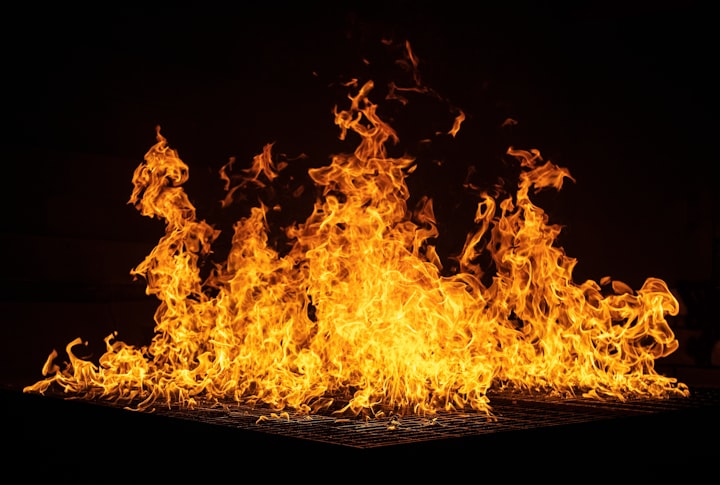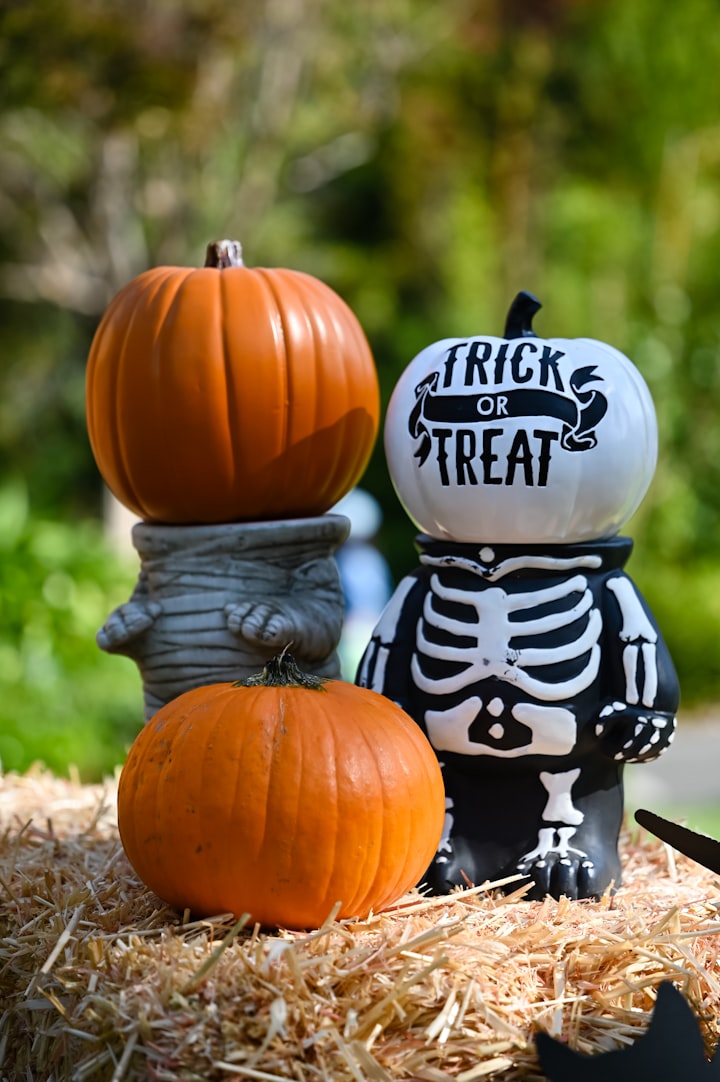Where is the Gasoline? (Revisited)
Revised from 2018

I push through the doors. They squeal. Overhead the rafters groan, heaving sighs. The cows sleep, the horses sleep, the crows in the rafters sleep. In the corner, a fat coil of rope. I take it up: it is heavier than bricks.
I cross the hay carpet. My feet are silent, but the cows murmur, the horses scratch the wood, the crows ruffle their wings—and settle.
There is a ladder at the end opposite the door. Draping the coil over my shoulder, I climb up to the loft, where hay bails stand in precarious towers. At the heart of the hay he has fashioned a bed for himself. He lays upon it with a wool blanket. Beneath the blanket, he is naked.
I drop the coil. Thud, and the crows stir again. A horse whinnies somewhere. In the darkness, he raises his head and gazes past me. Then he looks down, where the coil has already begun gathering dust. He picks up a frayed end, examines it, and shivers. He shivers often.
It’s time, I say.
He lifts himself, stretches, rubs his bleary eyes, then throws off the blanket. He is taller and thinner than me, and his dark skin gleams in the pencils of moonlight. The barn breathes. I wait near the ladder while he dresses—scratchy pants, stained baggy shirt, leather boots with scuffed toes. Not a tidy man—boy—young man. Whatever he is, the outfit of exile has made him scrappy, made his hair plume out in a bouncing ball, made his face darker with grime. Blood beneath his fingernails. The cuticles are stained.
Come, now, I say. Do not dilly.
He lifts the rope. He is feebler than he appears. It has been seven days since he ate any food. It has been seven weeks since he’s seen home. (I will take him home.) His knees buckle beneath the coil’s weight. He straightens, steadies, eases his breath. The slightest effort is colossal work. He will not be able to run for long.
Come, I repeat. Hurry. They will be here.
Maybe he understands, because he descends the ladder with the coil around his shoulder, one end dangling like a broken shoelace. I am with him on the ground floor, where he takes his time saying goodbye to the animals. He strokes the horse’s muzzle and its lips ripple. He strokes the cow’s forehead and its doleful eyes blink once. He strokes the central beam and whistles up to the rafters. A bleary crow squawks back.
Come, I repeat. Where is the gasoline?
“Where is the gasoline?” he says. He searches in the dark. He picks through rusty tools in the corner. This place has begun to decay.
It will be like straw. It will be like the inevitable finale of drought.
It is not here, I say. I push open the barn door, widening the cold black gap. He steps through the gap and is enveloped. I follow. (I am always following.) We walk in the damp grass. His boots go whoosh-shish, whoosh-shish, whoosh-shish. Across the pasture a line of trees. I barely see it, a black smudge.
How fast can you run?
He says nothing.
We go toward the house, where the farmer and his wife sleep, where the farmer’s children and their dog Baloney sleep. Baloney is a foolish dog who barks for no reason. Baloney will run into the barn, and he will try to save the horses, and he will try to save the cows, and he may even try to save the crows.
We ascend the front porch. I glance at him. He is frozen at the edge, staring through the door that squeals when it opens.
It will be fine.
I step through the door, entering the dark, warm house. The lingering scent of pork and potatoes passes through me. Come, I say, opening the door. It squeals. He steps through the doorway, still holding the rope.
Leave that out there.
He looks down at it, then decides to toss it on the porch—a soft thud.
You are a fool like Baloney.
He makes his way through the den, through the dining room, past the bedrooms. I wait by the door. If I enter further, Baloney will bark. I would like to strangle Baloney. I would like to string him up from the oak in the field, and I would like to watch the blood dry on his tendons in the sun.
He returns with the book of matches. He glares about the den as if searching for something else. I am impatient.
The knife, I say. Hurry.
After a moment of thought, he remembers and returns to the kitchen. Then he is back with the carving knife, which the farmer uses to cut the Christmas turkey while Baloney drools at his feet.
He goes out to the porch and picks up the rope. He slides the carving knife into the back of his waistband, and he stuffs the matches in his pocket.
The gasoline, I say. Where is the gasoline?
“Where is the gasoline?”
He peers about the barren porch. I look back at the barn, looming tall and ancient.
Have I ever told you about the farmer who built that barn? He used to have more cows than this farmer, and a separate one for the horses. One day, a bandit took shelter in the horse barn. Horses are not like cows; they cry and raise a fit at unwelcome visitors. The farmer heard them braying in the night. He found his musket, and, naked, he went over the dewey grasses and eased open the door. That door would not squeal, you know. He knew the bandit was hiding in the loft, which was larger than the one in the cow barn. He ascended the ladder, ignoring the whinnies, and he fired into the hay. It exploded and it was red. It is funny, because if the bandit had taken to the cow barn, he might have resided there for weeks. Cows are stupid.
He ignores me. He is going back to the barn, the only barn, the one that used to be the cow barn.
That horse barn was destroyed a few years later. There was a great storm, and when the lightning struck, it erupted into flames and killed all the horses. The cows were unharmed, though: there was not a weathervane atop their barn. I wish that there had been.
He goes back into the cow barn and looks around in the dark. Then he stoops in the corner to the right and lifts up the smelly can. “I knew it.” It sheds droplets on his boots.
Good. It is time. We must hurry.
I can hear them, far away. My hearing used to be better. I am cloudy these days. But I smell their torches, hear the rattle of their rifles, see the stamping of their boots—finer leather than he or I have ever had.
First, he douses the floor. Then he douses the ladder and the hayloft. His arms, flimsy from starvation, strain to lift the heavy can and spread it about. I want to seize it from him and do it myself.
He is nearly done now: he trails the gasoline out to the dirt, stopping only where the grass begins. He sets the can down, and as he searches his pocket for the matches, his eyes widen.
“What?” he says. “What?”
Move, I say. He does not move, and the rifle explodes. The shot misses him narrowly. He spins, ducks, sees the farmer looming lanky and garbed in a one-piece with the butt-flap flying free.
“You son of a bitch,” he growls. “I ought’ve known.”
Terrified, he cannot respond, even when the farmer lifts up the matchbook, which has a few blades of wet grass stuck to it.
“I’m gonna fix you,” the farmer promises. He aims again.
Do something! I scream.
He rushes forth, summoning mysterious strength, and charges into the old man before he can get his shot off. They tumble together through the dewy grass, wrestling for control of the rifle. I can hear the voices far away.
They are coming. Make quick work of him.
He gains the upper hand, pulls the rifle from the farmer, and whacks him with the butt. The farmer goes limp, wheezing, and says, “I gave you work.”
He bares his teeth. “You gave me fear.” He fires. The farmer’s chest explodes and the other is drenched with his blood. He stands, with rifle and coil and knife. He looks past me at the road and the village and the growing orange light.
They are coming, I repeat. He turns and retrieves the matchbook from the farmer’s hand. He goes to where he left the gasoline, at the edge of the green. He does not touch the dirt. He strikes a match, and drops it on the trail. A snake surges forward and swallows the open doorway…and light bursts to life.
He lights another match. This time he uses it to light the book, which he hurls at the barn. The comet lands, sparks, and the barn is aflame.
A great yapping erupts from the house; a blur bursts through the doorway while the riot lights approach. They are hollering.
We must go.
He gathers up the coil and starts in the opposite direction. Baloney flies past, howling, and enters the burning barn.
Across the field, through the dark, over the ridges of manure and clumps of wet grass. The moon a distant candle in the periphery. He reaches the edge of the field and turns back, chest heaving, gleaming with sweat. The men have found the farmer. Some linger over his body, but most are crossing the field with seven torches that silhouette their snarls. Angry shouts drift on the wind. There are other dogs barking: they brought dogs because they expected him to flee: they expected him to flee because they expected him to kill.
The woods. The river.
He turns, breaks through the trees. I follow, attached to his waist—but I am dwindling. Vision flickers. He is far away and near. He is at the river, where the flood took the bridge long ago. I was gone by then. Time took the bridge, widened the river’s girth.
I am tired.
He loops the rope. He throws the rope. The hounds break through the bramble, calling and calling. The men are dragged along through the dying leaves, howling and howling.
I am hot—I tell him—I am hot.
He doesn’t listen. He’s never listened. He forms a tight loop. Again he hurls the rope. It disappears in the dark—then draws taut. I am amazed, even in my agony. He bends, triple-knots the other end around a strong stump. He considers the rifle in his hands, then hurls it into the waters.
I am coming with you, I tell him. I am escaping, too.
But he wraps his arms and legs around the rope. He turns upside-down, and then he is crawling across, inching along.
But you need me. I brought you the rope. I gave you the tools.
I am hot. Oh, I am hot.
The hounds break through the trees. One leash has snapped, but the others drag their masters like rocks. The leader bounds over the bank as I erupt in flame. Halfway across, the runaway twists his head around, sees the beast midair. He draws the carving knife and drives it upward. The hound falls into it, into him…and the rope snaps. The coil around the stump flies loose, and the two disappear into the waters as the men halt along the bank and hurl curses after them into the raging depths.
Across the trees and fields and the waning night, the barn’s rafters collapse, and the crows alight from atop to seek a softer resting place.
About the Creator
Jay Tilden
Jay Tilden is a fiction writer and student of history, originally from Vermont. He does not like people, which is probably why most of them die in his stories.






Comments
There are no comments for this story
Be the first to respond and start the conversation.